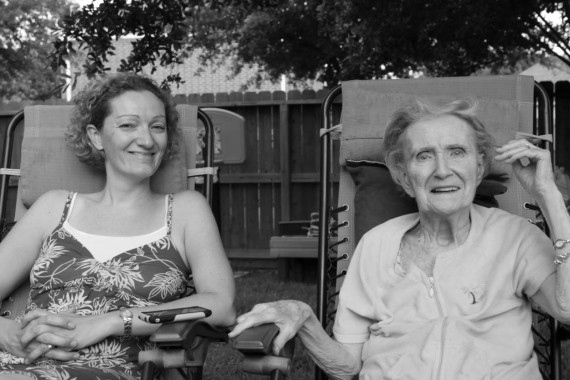My LEGO loving boys have been watching the Ninjago series on Netflix. One recent episode captured more of my attention than I would readily admit in certain social circles.
In the episode “Wrong Place, Wrong Time,” the bad guy (Lord Garmadon) wishes that the good guys (Ninjas) never existed, so he goes back in time to make it so. The Ninjas follow him, intending to save the day, but are warned by their mentor (Sensei Wu) that if they change anything, they change everything.
The episode reminded me of a conversation I had with my Grandmom in one of her last visits to my house.
“Kid, there were some difficult times in my life. I’ll tell you. 1936 was hard. Extremely hard. But let me just say this: I have no regrets. Isn’t that something? At my age [83]? No regrets.” She paused and turned to look at me, “Can you say the same for yourself? Do you have any regrets?”
I looked at her with tears in my eyes. “No. I can’t say that. I do have a huge regret. My first marriage was a huge mistake. I regret that it ever happened. I regret making that choice. With every fiber of my being, I regret that.”
Grandmom does this vice grip pinch of my upper arm with surprising strength for a feeble old lady and tells me, “I’m not saying I never made any mistakes. Kid, I made plenty of mistakes. PLENTY. Ask anyone. I’m talking REGRETS.”
“I know, Grandmom. I do. I wish it wasn’t a regret. But it is.”
“I hope one day you change your mind. I hope one day you can get to my age and say that you have no regrets. Because that’s really something.”
Grandmom died December 8, 2011, still having no regrets.

So as I sat in the dining room, sipping my tea and finishing breakfast, I hear Sensei Wu tell the Ninjas that if you change anything, you change everything. And I finally got it.
Regret and Remorse
Regret and remorse are two different things. I have sincere remorse for the series of well-intentioned, yet ill-informed decisions that led to one of the lowest point in my life. I am deeply sorry. The turmoil, crisis, depression… I am very sorry.
But Grandmom was talking about the kind of regret that wipes the event off the face of the earth. And as Sensei Wu said, change anything, change everything.
My husband… my boys… my friends… my community… my personal and spiritual growth… No. I don’t want to risk changing who, and what, and where I am now. So I’m making peace with how I got here.
I’m getting closer to telling Grandmom, “No. I don’t have any regrets.” And I hear her saying, “That’s good, kid. That’s great!” (Though, the imaginary vice grip hurts a lot less than the real one.)
A Caveat – on Divine Providence and Evil
As I note that I wouldn’t trade any of the goodness in my life, even to remove my deepest remorse, I feel the need to address one of my personal pet peeves. The expression “Everything happens for a reason.” I hate it.
Imagine a rape survivor hearing that. Or a Holocaust survivor.
I want to think that the sentiment people are trying to express is one of hope… but something gets lost in the translation.
Allow me to get all Catholic on you and pull out my Catechism. In the section on Divine Providence and the Scandal of Evil (See CCC, 309-314), the Catechism lays it out:
- God is all good
- God does not cause evil to happen
- Evil happens
Then, paragraph CCC, 311 quotes St. Augustine:
For almighty God…because he is supremely good, would never allow any evil whatsoever to exist in his works if he were not so all-powerful and good as to cause good to emerge from evil itself.
So God didn’t cause the bad things to happen to you or me or anyone else. Everything happens for a reason? NO!
It’s more like: When life gives you lemons, God–as only God can do–makes the best divine lemonade you could possibly imagine.
God–and only God–can transform evil into something good. I mean look what he did with the Crucifixion. That’s some pretty good Divine Lemonade right there.
I digress.
And I hope you don’t have any regrets either. Let’s all make Grandmom proud.















